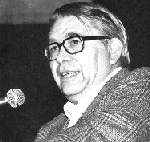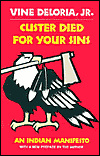Native American Leader Vine Deloria, Jr. Dies at 72
 Here is the obituary from the the Los Angeles Times (note that I'll have a comment on it at the end):
Here is the obituary from the the Los Angeles Times (note that I'll have a comment on it at the end):DENVER -- Vine Deloria Jr., a groundbreaking author and an influential advocate of American Indian rights, has died, family members said. He was 72. Deloria, a Sioux Indian, died Sunday of complications from an aortic aneurysm, said his son, Phil Deloria.A good article but it omits several important facts about Vine Deloria jr.
The author was considered one of the most outspoken -- and persuasive -- proponents of Indian cultural and political identity. His best-known book, "Custer Died for Your Sins: An Indian Manifesto," attacked the treatment of American Indians by settlers and the government.
"I think he opened Americans' eyes to the real history of Native Americans and the injustice of past federal policies," said John Echohawk, executive director of the Native American Rights Fund in Boulder.
"Through Vine's leadership, tribes started to stand on their treaties and their right to self-determination," he said.
As president of the National Congress of American Indians in the 1960s, Deloria helped forge a united, "pan-Indian approach" in dealing with the federal government, said Patricia Limerick, faculty chair of the Center of the American West at the University of Colorado.
"His role in getting Indian people heard in the last half of the 20th century is unparalleled," she said. "(He was able to) get his message into camps where it had never been heard."
Deloria was born in 1933 in Martin, S.D. He earned an undergraduate degree from Iowa State University and a law degree from the University of Colorado. He taught at the University of Colorado from 1990 until he retired in 2000.
Most importantly, the Times fails to mention his Christian roots. His father, Vine Deloria, Sr., was one of the first Native Americans to be ordained as a priest in the Episcopal Church. Vine, Jr., planned to follow in his father's footsteps, completing a Master of Theology degree from Lutheran School of Theology in 1963 before deciding that his advocacy for his people could be more effective with a law degree.
 His writings were, at first, grounded in a Christian world view that, he believed, needed to be reinterpreted by Indian and "translated" into the culture and experience of Native Americans. Even the title of his first, and most influential book, "Custer Died for Your Sins," reflected the Christian influence of his thought.
His writings were, at first, grounded in a Christian world view that, he believed, needed to be reinterpreted by Indian and "translated" into the culture and experience of Native Americans. Even the title of his first, and most influential book, "Custer Died for Your Sins," reflected the Christian influence of his thought.Later in life, apparently, he came to believe that the Christian faith was, fundamentally, unable to adapt itself to the vocabulary and values of Native American spirituality.
An article in Indian Country earlier this year described Deloria as a "Moderate Radical." I think that lable fits him well. He was radical and provocative enough to transform the way Whites and Native Americans view one another and their collective history, but moderate enough to bring about that change peacefully.
Vine Deloria Jr. was scheduled to be the keynote speaker at a conference by wife attended in South Dakota last month. His failing health made it unable for him to attend. But he did videotape a shorter version of his talk that was shown in his absence. It was the last public address he was able to give.
The accumulated injustices and grievences endured by Native Americans continue to haunt every American, no matter what our race, faith, or cultural origin may be. There remains a great need for reconciliation between every part of American society and the citizens of the indiginous nations that live among us.
For Native Americans, Vine Deloria, Jr. was (much as Dr. Martin Luther King, Jr. was for African-Americans) "a voice crying in the wilderness," calling the people and institutions of United States to repent of their sins and to seek justice for, forgiveness from and reconciliation with those trampled people who once stood on the beach and watched as European explorers "discovered" the "New" World.


<< Home